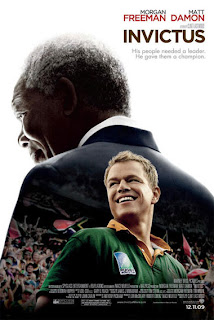Invictus

In 1995, South Africa had long been in the wilderness when it came to international sports. Blackballed due to their evil system of apartheid, they were awarded the Rugby World Cup after apartheid fell and Nelson Mandela was released from prison, blacks were allowed the vote, and Mandela was elected president. Rugby was a sport beloved by the white population, but hated by the blacks, who equated the green and gold colors and the springbok mascot with oppression (I imagine much like African Americans view the Confederate stars and bars). Therefore, when Mandela publicly got behind the rugby team it seemed by some blacks as a betrayal.
This is the story of Clint Eastwood's corny but effective Invictus. It's not a daring work of cinema--it has no more flair that a made-for-TV movie, but it pushes all the right buttons and is carried by a magisterial performance by Morgan Freeman as Mandela. Freeman, who has played God and the U.S. president, may be the only actor in the world fit to play Mandela, who seems to be one of the few great figures of recent history to deserve the accolades.
What Mandela realizes is that if the entire country, black and white, gets behind the rugby team then it will go a long way in helping him achieve his goals of reconciliation and forgiveness. He surprises many by not firing all the white staff in the capital, and then enlists Afrikaaner men on his bodyguard detail, angering the black leader of the squad (Julian Lewis Jones). Even his chief of staff and daughter are against it. But Mandela persists, meeting with the captain of the team (Matt Damon), who seems to bear no racial animosity (though his father does) and just wants to win the Cup.
This is a good story, and mostly Eastwood stays out of the way, adding no filigree. He does occasionally make things go clunk by adding a ton of exposition (including a scene in which an aide explains the way the Cup tournament works, which seemed unnecessary--I would have liked more explanation of the rules of the game) and scores of reaction shots, as if he were exercising a long-held dream of directing the Super Bowl broadcast. But most of it works, and call me an old softie but I found certain scenes, such as the Springboks teaching a group of black kids how to play the game, to be emotionally powerful.
Invictus (the title refers to a Victorian-era poem that Mandela used for inspiration during his prison sentence) has a major obstacle in North America, in that few of us know about rugby. It appears to combine certain elements of American football--the field goal and the multiple laterals of a last-second kick-off return, with an annoying aspect of soccer--no one but the official knows when time has run out (several times characters in the stands have to turn to others and ask "Did we win?" Still, the final match, between the Springboks and the feared New Zealand squad, is well-edited and exciting (one advantage at being ignorant of the game is that I was unsure of the outcome, something I'm sure every South African would know).
Credit should also be given to Eastwood, Freeman, and screenwriter Anthony Peckham for making Mandela a human being and not a saint. His estrangement from his family is not avoided. He is obviously a great man, but a man nonetheless. I remember the struggle against apartheid vividly, having attended a rally in Central Park back in 1985. To look back and think that a horrible thing was eradicated in relatively short order and has been shoved into the ashbin of history is kind of nice, and if Invictus is by-the-numbers filmmaking, well, that isn't always so bad.


Comments
Post a Comment